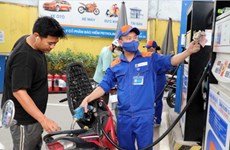Vietnam confidently integrates into the world: paper
Important developments were seen in Vietnam’s external affairs in
2013 with numerous exchanges of high-level visits. The successes are a
source of encouragement for the country to continue on the path of
international integration in the Year of the Horse. Analysis by Nhan Dan
(People) online newspaper.
Important developments were seen in Vietnam’s external affairs in
2013 with numerous exchanges of high-level visits. The successes are a
source of encouragement for the country to continue on the path of
international integration in the Year of the Horse. Analysis by Nhan Dan
(People) online newspaper.
International trust in the development strategy
In 2013, Vietnamese leaders were invited to make keynote speeches at global conferences and forums on politics, security and economics, helping Vietnam’s voice be heard on international issues and convey the country’s policies to friends and partners.
Notably, leaders brought the message ‘Building Strategic Trust’ for peace and development to the United Nations (UN) General Assembly and the Shangri-La Dialogue, and also during high-level visits to many countries across the globe.
Strategic trust should be incessantly nourished in a truthful, sincere and practical manner at a time when the world is facing traditional and non-traditional challenges which are creating negative impacts for common peace, stability and development. Trust originates with friendship and co-operation, and hinders any attempts to cause conflicts so that strategic trust construction and consolidation for peace and prosperity and in accordance with international law is needed.
The Vietnamese people have an ardent desire for peace and prosperity as they have experienced poverty and hardship during the country’s history of national construction and defence. International prestige has resulted from tireless efforts in enhancing exchanges and international cooperation sincerely and willingly in a spirit of mutual trust and respect and in appreciation of peace protection. This has created a strong appeal to friends and partners, causing them to tighten relations with Vietnam and to build further strategic and sustainable relations.
Through Party and State leaders’ visits to other countries and foreign leaders’ visits, Vietnam has now established strategic partnerships with France, Italy, Indonesia, Singapore and Thailand, whilst managing to enhance the relationship with the US to a comprehensive partnership. As a result of these new developments, Vietnam now has 13 strategic partners and 11 comprehensive and so has fulfilled the target of establishing strategic and comprehensive partnerships with all the five powers which are the permanent members of the UN Security Council.
Trust has also helped the country become a member of the UN Human Rights Council for 2014-2016 with 184 approval out of the 192 votes, the highest received among candidate countries, proving clearly Vietnam’s confidence index.
Joining the Human Rights Council is an important step in the roadmap of realising the foreign policy, ‘be a trusted and responsible friend and partner of the international community’, which reflects the viewpoint of the Party and State considering human rights as a common value and aspiration of mankind and affirming the policy of respecting and promoting human rights, and making contributions to international cooperation in this field.
Furthermore, by fulfilling all of the UN Millennium Development Goals before the 2015 target, Vietnam has gained even greater trust from the international community particularly from the early fulfillment of the UN’s Millennium Goals in poverty and hunger eradication. From a hunger stricken country, Vietnam has become the largest rice exporter, helping ensure the world’s food security. This effort was recognised by the UN Food and Agriculture Organisation 2013 awards, where Vietnam and 37 other countries were recognised for their advanced approaches.
Firm integration
Success in political diplomacy is part of the ongoing overall success in international cooperation which is a result of the comprehensive renewal cause initiated and led by the Communist Party of Vietnam over the past 30 years. Among important developments in international integration is the Politburo’s Resolution 22 dated April 10, 2013, which lays a firm foundation and creates new stimulus for the country’s efforts to navigate proactively and confidently. Focusing on neighbouring countries, big partners and regional and international forums becomes a target and a lodestar of all external relation channels.
The global economy is still in crisis but Vietnam’s economy maintained sustainable growth in 2013. This is valued by the international community and deepens the trust from potential partners in Vietnam. Economic cooperation is important to the country’s international integration targets, which focus on growing relations with neighbouring countries, strategic partners, traditional friends and big economic centres in the world.
Following the global trend of economic connectivity, Vietnam has actively participated in negotiations for six free trade agreements (FTA), notably new-generation FTA; the Trans-Pacific Partnership; ASEAN+6, which includes 10 ASEAN member countries, China, India, Japan, the Republic of Korea, New Zealand and Australia; and the Regional Comprehensive Economic Partnership. The establishment of these FTA will provide Vietnam with a network of 56 partners, laying strategic, political and economical foundations for links with the world’s leading economic centres. The successful organisation of the economic cooperation forum between Vietnam and the Middle East – North African partners - potential markets - fostered links between Vietnam and the region, especially in economics, trade, investment, oil and gas and labour.
Culturally, Vietnam has also succeeded with the completion of its four-year term as a member of UNESCO's Executive Board and also with the election, for the first time, to be a member of the UNESCO’s World Heritage Committee. This is an opportunity for Vietnam to directly participate in the process of deliberation over heritage recognition, whilst protecting and promoting the world’s heritage values.
Vietnam’s participation in the UN’s peacekeeping activities was applauded this year. It is said that the Vietnamese fully understand values of peace and strive to maintain economic stability and ensure social welfare in order to consolidate the country’s peace and prepare for its contributions to the world’s common affairs.-VNA
International trust in the development strategy
In 2013, Vietnamese leaders were invited to make keynote speeches at global conferences and forums on politics, security and economics, helping Vietnam’s voice be heard on international issues and convey the country’s policies to friends and partners.
Notably, leaders brought the message ‘Building Strategic Trust’ for peace and development to the United Nations (UN) General Assembly and the Shangri-La Dialogue, and also during high-level visits to many countries across the globe.
Strategic trust should be incessantly nourished in a truthful, sincere and practical manner at a time when the world is facing traditional and non-traditional challenges which are creating negative impacts for common peace, stability and development. Trust originates with friendship and co-operation, and hinders any attempts to cause conflicts so that strategic trust construction and consolidation for peace and prosperity and in accordance with international law is needed.
The Vietnamese people have an ardent desire for peace and prosperity as they have experienced poverty and hardship during the country’s history of national construction and defence. International prestige has resulted from tireless efforts in enhancing exchanges and international cooperation sincerely and willingly in a spirit of mutual trust and respect and in appreciation of peace protection. This has created a strong appeal to friends and partners, causing them to tighten relations with Vietnam and to build further strategic and sustainable relations.
Through Party and State leaders’ visits to other countries and foreign leaders’ visits, Vietnam has now established strategic partnerships with France, Italy, Indonesia, Singapore and Thailand, whilst managing to enhance the relationship with the US to a comprehensive partnership. As a result of these new developments, Vietnam now has 13 strategic partners and 11 comprehensive and so has fulfilled the target of establishing strategic and comprehensive partnerships with all the five powers which are the permanent members of the UN Security Council.
Trust has also helped the country become a member of the UN Human Rights Council for 2014-2016 with 184 approval out of the 192 votes, the highest received among candidate countries, proving clearly Vietnam’s confidence index.
Joining the Human Rights Council is an important step in the roadmap of realising the foreign policy, ‘be a trusted and responsible friend and partner of the international community’, which reflects the viewpoint of the Party and State considering human rights as a common value and aspiration of mankind and affirming the policy of respecting and promoting human rights, and making contributions to international cooperation in this field.
Furthermore, by fulfilling all of the UN Millennium Development Goals before the 2015 target, Vietnam has gained even greater trust from the international community particularly from the early fulfillment of the UN’s Millennium Goals in poverty and hunger eradication. From a hunger stricken country, Vietnam has become the largest rice exporter, helping ensure the world’s food security. This effort was recognised by the UN Food and Agriculture Organisation 2013 awards, where Vietnam and 37 other countries were recognised for their advanced approaches.
Firm integration
Success in political diplomacy is part of the ongoing overall success in international cooperation which is a result of the comprehensive renewal cause initiated and led by the Communist Party of Vietnam over the past 30 years. Among important developments in international integration is the Politburo’s Resolution 22 dated April 10, 2013, which lays a firm foundation and creates new stimulus for the country’s efforts to navigate proactively and confidently. Focusing on neighbouring countries, big partners and regional and international forums becomes a target and a lodestar of all external relation channels.
The global economy is still in crisis but Vietnam’s economy maintained sustainable growth in 2013. This is valued by the international community and deepens the trust from potential partners in Vietnam. Economic cooperation is important to the country’s international integration targets, which focus on growing relations with neighbouring countries, strategic partners, traditional friends and big economic centres in the world.
Following the global trend of economic connectivity, Vietnam has actively participated in negotiations for six free trade agreements (FTA), notably new-generation FTA; the Trans-Pacific Partnership; ASEAN+6, which includes 10 ASEAN member countries, China, India, Japan, the Republic of Korea, New Zealand and Australia; and the Regional Comprehensive Economic Partnership. The establishment of these FTA will provide Vietnam with a network of 56 partners, laying strategic, political and economical foundations for links with the world’s leading economic centres. The successful organisation of the economic cooperation forum between Vietnam and the Middle East – North African partners - potential markets - fostered links between Vietnam and the region, especially in economics, trade, investment, oil and gas and labour.
Culturally, Vietnam has also succeeded with the completion of its four-year term as a member of UNESCO's Executive Board and also with the election, for the first time, to be a member of the UNESCO’s World Heritage Committee. This is an opportunity for Vietnam to directly participate in the process of deliberation over heritage recognition, whilst protecting and promoting the world’s heritage values.
Vietnam’s participation in the UN’s peacekeeping activities was applauded this year. It is said that the Vietnamese fully understand values of peace and strive to maintain economic stability and ensure social welfare in order to consolidate the country’s peace and prepare for its contributions to the world’s common affairs.-VNA











